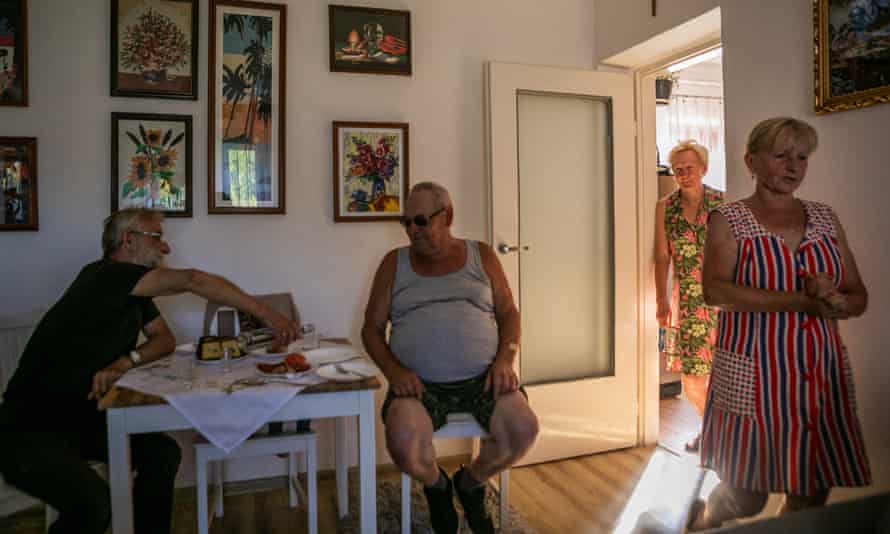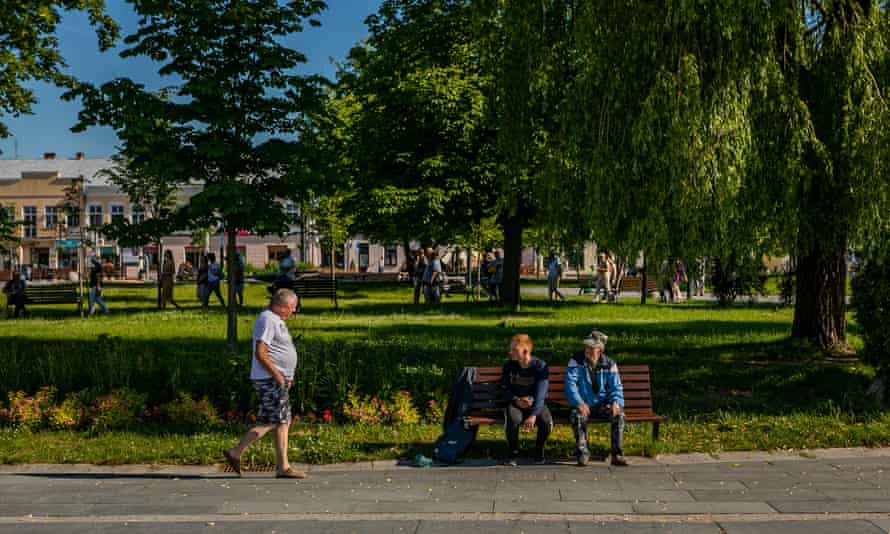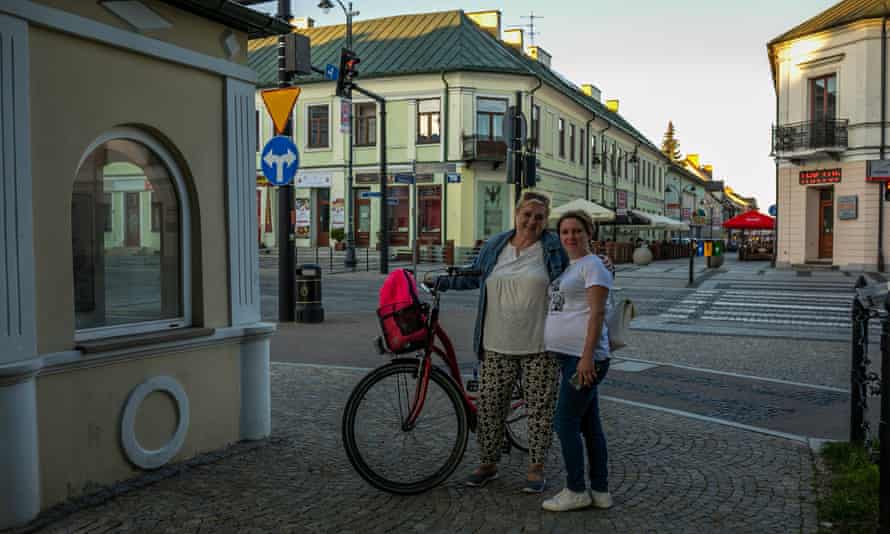Sixty-mile strip on edge of Poland and Lithuania is seen as vulnerable due to its position between Russian exclave of Kaliningrad and Belarus
Russia-Ukraine war: latest updates
Stefan Bilas, 68, says he hears the Russians sometimes. It can be the growl of tanks that drowns out the gentle clucking of the chickens in his front yard, or more often the whirr of attack helicopters or the deafening roar of fighter jets, destination unknown.
Artillery fire was heard the other night and there is a shooting range somewhere over there, he points. The lights of a Russian watchtower can be seen at the dead of night. “Peace,” toasts the retired farmer, knocking back a vodka.
Bilas, the son of a Ukrainian forcibly resettled to the area by the Soviets in 1947 under Operation Vistula, Joseph Stalin’s attempt to de-Germanise territory under his control, was born and bred in this Polish village, Rudziszki, where the one road of 63 houses ends at a closed gate to a forest. Entrance is forbidden. Strangers to the village are not even allowed to walk as far as Bilas’s home.
That is because the trees mark where Poland stops and the 5,800 sq mile (15,000 sq km) exclave of Kaliningrad on the Baltic Sea begins. Bilas’s small white-washed house is the last on the road, about 50 metres from the gate.
The forest – just 100 metres deep but thick and tall – covers almost all sins. For while Bilas and his wife, Halina, 65, and their neighbours Henryka Wolodzko, 63, and Jan Wolodzko, 67, can hear the Russians, they cannot see them, they say, as Halina places a plate of garlic sausage and salted tomato slices on the kitchen table. Nor do they want to.

“I think about it every day,” says Bilas, knocking back another shot. “They could come any time. Kill us in our beds.” “What do I think of them?” he says, picking up a copy of a Polish-language biography of Ukraine’s president, Volodoymr Zelenskiy. “I’d better not say.”
This is “Suwałki Gap” territory, the 60-mile or so long strip of land around the border of Poland and Lithuania that is straddled to the west by the Russians and to the east by Kremlin-friendly Belarus.
It is, military analysts say, where Vladimir Putin would probably strike first should he decide that western involvement in his war in Ukraine has left him with nothing to lose.
The Kremlin strategy, war planners think, would be to storm Lithuania, Latvia and Estonia from mainland Russia. The Baltic capitals might be taken in less than three days, analysts suggest.
Simultaneously, Putin would try to cut off Nato’s attempts to reinforce by turning this swathe of border area, the one land corridor that would be available to the western military alliance, into an impenetrable hellscape.
There are just two roads and one railway line going from Poland to Lithuania through the gap, which is otherwise marshy and difficult terrain for a mechanised army.
Belarus’s dictatorial leader, Alexander Lukashenko, has shown in the war in Ukraine that he is willing to let Putin use his country as a launchpad for an invasion.
Kaliningrad is bristling with weapons, including hypersonic missiles. In recent days, Russian news wires have reported that service personnal from the Baltic Sea fleet of the Russian Federation, based in Kaliningrad, have been conducting a training exercise for missile and artillery units.
The provocative timing of the Russian exercises is no doubt deliberate. The Suwałki Gap has been the subject of intense interest at home and abroad in light of the row between Lithuania and the Kremlin.
Lithuania has been accused of “blockading” Kaliningrad after its state railways refused to allow the rail transit of steel and iron ore, now prohibited from being imported into the EU, from mainland Russia to Kaliningrad.
The Russian foreign ministry has warned the government in Vilnius of retaliation that will “have a serious negative impact on the population of Lithuania”.
Kaliningrad, once comfortably nestled within the Soviet Union, is in the post-communist world stranded among EU and Nato allies and reliant on much of its goods – including metal, coal, gas and oil – arriving on the 100 trains from mainland Russia that are permitted to cross Lithuania under deals struck in 2004.
The Kremlin says blocking the transit of any goods destined purely for Kaliningrad is an “illegal and unprecedented” act that flies in the face of those agreements. Lithuania has said it is merely enforcing EU laws.
The European Commission, on whose guidance Lithuania has acted, has been visibly alarmed. The EU’s high representative for foreign affairs, Josep Borrell, said on Monday he would “double check” whether the Lithuanians were acting to the letter of the law.

The commission subsequently said it would issue additional guidance that would “avoid sanctions evasion while allowing free transit”, in what appeared to be something of a retreat. But perhaps not one the Lithuanians are willing to make.
Lithuania’s prime minister, Ingrida Šimonytė, said at a leaders summit in Brussels that the transit ban on steel and ferrous metal through the EU was part of the bloc’s sanctions, and agreed by all 27 members.
Petras Auštrevičius, a Lithuanian MEP, said he was unimpressed by the commission’s attempt to involve itself in an issue that was for leaders and not officials in Brussels.
Lithuania is among the post-Soviet states that have been rallying the EU and Nato to be tougher on the Kremlin. Should those on the trains transporting permitted goods on the railway into Kaliningrad peek through their curtained windows, they would be greeted at a stop in Vilnius and the customs post on the Kaliningrad border with the sight of large posters showing images of the war in Ukraine.
It is unclear whether Vilnius will take a step back.
There is much talk of the dispute in Suwałki, 100 miles east of Bilas’s village, and which the gap is named after. The mayor has drawn up a list of buildings that can be adapted into bomb shelters, while Malgorzata Olszewska, 52, and Diana Hiczel, 37, returning via the city’s constitution park from a shift in the kitchen of a local restaurant, say talk radio is filled with chatter about it. “Yes we are worried,” says Olszewska, before explaining the military concept. Hiczel nods. “Everyone is worried,” she says.

Apart from Polish forces, the closest Nato troops to Suwałki are in a vast military camp at Bemowo Piskie, a village 60 miles south. It is filled with 800 soldiers from the 1st battalion, 185th Infantry Regiment from the California National Guard, along with another 400 from the British Royal Dragoons and other Romanian and Croatian units. There is a village v Nato volleyball competition arranged for Sunday, says the local mayor, Boguslaw Bednarski, 56. It is a close-knit military community. His daughter is married to a soldier from Tennessee whom she met during the American’s tour here. “They will never attack Poland and Lithuania – we have Nato,” Bednarski says.
Sir Richard Shirreff, who served as Nato’s deputy supreme allied commander Europe between 2011 and 2014, and wrote a thriller in 2017 in which Putin’s Russia invades Ukraine before attacking Lithuania and the other Baltic states, is not so convinced.
“What does Putin want?” he asks. “He wants to re-establish a Russian empire, he wants to reunite Russian speakers under the banner of Mother Russia, to neutralise or destroy Nato, to decouple America from European security. He has said as much.
“Meanwhile, he has looked at the west and seen consistent western weakness: the disarmament of European countries; he has looked at the Barack Obama chemical weapons red line in 2013 and watched as Obama stepped back; absolutely watched how Trump treated the Nato alliance, and the collapse of the Nato mission in Afghanistan. What he has seen is consistent western weakness and he has decided to take the opportunity to achieve his strategic aims.”
Shirreff says the sabre-rattling in recent days should not be dismissed but instead lead to a much a greater reinforcement of Nato forces in the region.
He says: “The threat to Lithuania particularly given the Lithuanians have imposed sanctions on Russian goods to Kaliningrad is certainly a real concern. The reality is that number one Russia is completely fixed on Ukraine at the moment but that does not mean there is not a threat. The only response is reinforcement.”
As for the consequences of Russia succeeding in blocking the Suwałki Gap, Shirreff sees nothing good for Bilas and his neighbours. “There is no way Nato would be able to recapture the Baltic states without mounting an operation of the scale of D-day plus, frankly,” he says.